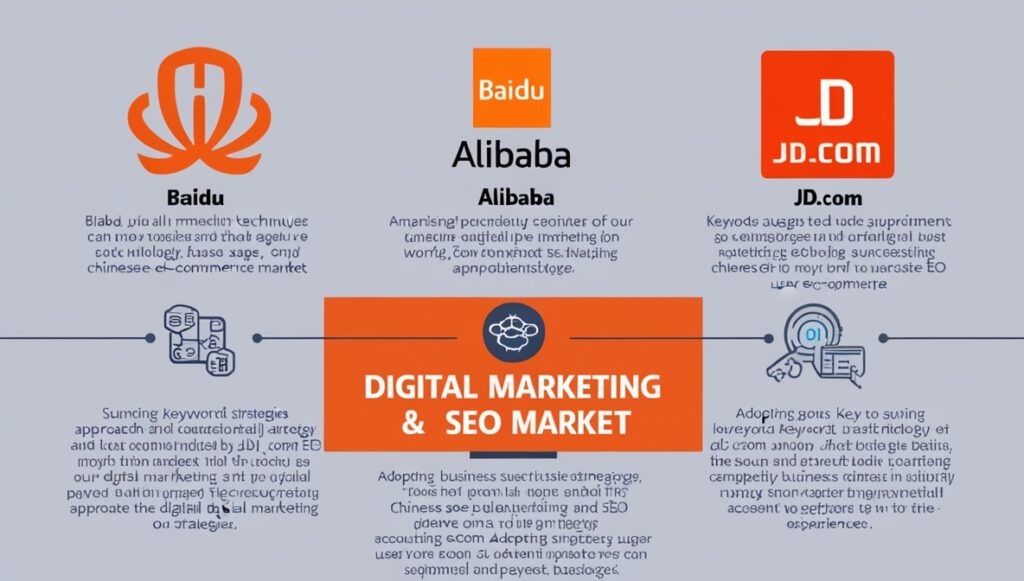
In recent years, the Chinese e-commerce market has emerged as one of the most dynamic and influential sectors globally. Three primary players, Baidu, Alibaba, and JD.com, dominate this landscape, each contributing uniquely to the developments in digital commerce. As businesses worldwide seek to understand and tap into the enormous potential of Chinese consumers, it is crucial to explore how these titans shape the market and the strategies they employ.
In this article, we’ll analyze the roles of Baidu, Alibaba, and JD.com, focusing on their strategies, performance, and future outlook while providing insights on how businesses can benefit from their methodologies to enhance their own SEO and digital marketing strategies.
Understanding the Ecosystem

1. The Players: Overview and Influence
- Baidu: Primarily known as China’s leading search engine, Baidu has expanded its offerings to artificial intelligence, cloud computing, and various digital services. Its dominance in search enables businesses to reach audiences effectively through paid advertising and SEO strategies tailored to its unique algorithm.
- Alibaba: Comprising numerous platforms such as Taobao, Tmall, and AliExpress, Alibaba offers comprehensive e-commerce solutions. Its innovative marketing approaches and vast consumer base have made it a critical player in online retail.
- JD.com: Known for its commitment to quality and efficiency, JD.com operates a direct sales model, ensuring product authenticity and faster delivery times. JD’s logistics infrastructure is among the most advanced in China, allowing it to compete aggressively against Alibaba.
2. The Competitive Landscape
While Baidu, Alibaba, and JD.com are titans in their own right, each faces significant competition from both domestic players and foreign entrants. These companies are consistently innovating their business models and exploring new technologies, keeping the competitive spirit alive in the market.
Strategies for Success
1. SEO and Marketing Integration
Each of these companies effectively leverages SEO to boost visibility and drive traffic to their platforms. They utilize data-driven insights to optimize their strategies continually. Here’s how businesses can adopt similar tactics:
- Keyword Research: As highlighted by strategies employed by Baidu and Alibaba, effective keyword usage is crucial. Utilize tools to find high-traffic keywords relevant to your audience and incorporate them naturally into your content.
- Content Quality: Engaging, informative, and relevant content that answers users’ queries can significantly enhance SEO. JD.com has excelled in this area by providing in-depth product descriptions and customer reviews, fostering consumer trust and driving sales.
- Localized SEO: Since Chinese consumers often search in Mandarin, ensuring that your content is available in the local language and optimized for local search engines like Baidu is essential.
2. Leveraging Technology
The digital marketing landscape is rapidly evolving with technological advancements, and these companies are at the forefront of this revolution.
- Artificial Intelligence and Machine Learning: Baidu’s investment in AI allows it to enhance user experience and personalize search results. Integrating AI-driven insights into your SEO strategy can help refine your target audience and improve engagement rates.
- Big Data Analytics: Implementing big data strategies helps these companies understand customer behavior and market trends. Businesses can harness analytics tools to refine their marketing strategies and adapt to real-time changes in consumer preferences.
3. Omnichannel Strategies
Baidu, Alibaba, and JD.com operate across multiple channels, ensuring that they can reach consumers wherever they are.
- Social Media Integration: Platforms like WeChat and Douyin (TikTok) are becoming increasingly vital in driving traffic. These companies employ various social media strategies to engage with consumers and funnel them to their websites.
- Mobile Optimization: With a considerable portion of e-commerce transactions happening on mobile devices, these companies ensure that their websites are mobile-friendly. Businesses must invest in responsive designs and fast-loading pages to capture this audience segment effectively.
Future Outlook
1. Regulatory Challenges and Adaptation
The Chinese government’s increasing scrutiny over tech companies presents challenges. However, these firms are adept at navigating regulatory changes. Their ability to adapt swiftly to new policies may serve as a valuable lesson for businesses in any industry.
2. Sustainability and Corporate Social Responsibility
As consumer awareness about sustainability grows, Alibaba and JD.com are investing in eco-friendly practices. Baidu is also exploring how AI can contribute to more sustainable business practices. Companies can benefit from integrating sustainability into their brand narratives, which can resonate with eco-conscious consumers.
3. Global Expansion
While these companies have an established presence in China, their strategic initiatives are also focused on international markets. For digital marketers, understanding their global outreach strategies can provide insights into effective expansion tactics and potential partnerships.
Conclusion

Baidu, Alibaba, and JD.com are not just leaders in the Chinese e-commerce market but also serve as case studies in successful digital marketing and SEO strategies. By understanding their techniques and approaches, businesses can better position themselves in an increasingly competitive global landscape. Adopting key strategies like effective keyword usage, leveraging technology, and focusing on user experience can significantly enhance your own digital marketing efforts.
As the e-commerce landscape continues to evolve, staying informed about these industry giants’ actions and adapting your strategies accordingly will be crucial in finding success in this fast-paced environment.
In summary, while embracing the best practices from Baidu, Alibaba, and JD.com, companies can optimize their SEO efforts and maximize their digital marketing potential, seizing opportunities in the expansive Chinese market and beyond.

